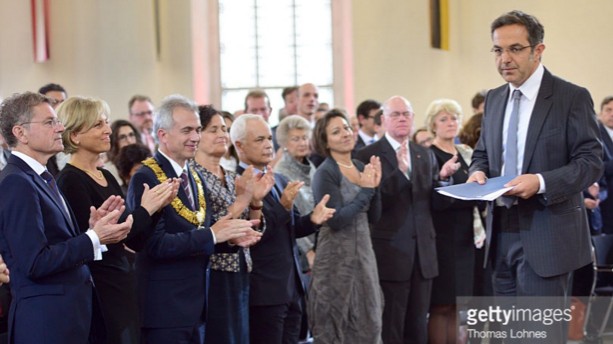Three months have passed since Navid Kermani – author, essayist, practitioner of Christian-Muslim dialogue – was given the 2015 Peace Prize of the German Book Trade. Three months have passed, but his words have not faded.
That night, wearing a suit to match his graying hair, he took the podium in St. Paul’s church in Frankfurt, Germany and, like all good journalists, began with the crisis: a man has been kidnapped.
On the day I received the news of the Peace Prize of the German Publishers’ Association, the same day, Jacques Mourad was abducted in Syria. Two armed men entered the monastery of Mar Elian on the outskirts of the small town of Qaryatain and demanded to see Father Jacques. They found him no doubt in his bare little office, which also served as his living room and bedroom, seized him and took him with them. On May 21, 2015, Jacques Mourad became a hostage of the so-called Islamic State.
As Mr. Kermani continues, we learn who Fr. Jacques Mourad is and what he is going through now. And we learn from the learned Mr. Kermani what he himself has learned from Fr. Mourad:
Father Jacques defended [Islam] the community he does not belong to, and criticized his own. A few days before his abduction … Father Jacques still insisted that these terrorists were distorting the true face of Islam. I would take issue with any Muslim whose only response to the phenomenon of the Islamic State was the worn-out phrase that their violence has nothing to do with Islam. But a Christian… such a man of God displays a magnanimity that I have encountered nowhere else, except in the lives of the saints.
And then he turns to what this means for himself
A person like myself cannot and must not defend Islam in that way. The love of one’s own – one’s own culture, one’s own country and also one’s own person – manifests itself in self-criticism. The love of the other – of another person, another culture and even another religion – can be far more effusive; it can be unreserved. It is true that the prerequisite for love of the other is love of oneself. But one can only fall in love, as Father Paolo and Father Jacques did with Islam, with the other. Self-love must be a struggling, doubting, constantly questioning love if it is to avoid falling prey to narcissism, self-praise, self-satisfaction. How true that is of Islam today! Any Muslim who does not struggle with it, does not doubt it and does not critically question it does not love Islam.
The remainder of Mr. Kermani’s speech – touching on the roots of ISIS, the destruction of holy places and holy persons, Sufism, and hope in the face of despair – is broad indeed and worth reading on its own. (You can find it here.) But the heartbeat of his speech, the heartbeat the seems not to fade but to grow louder in my ears over these three months, is the section about love of self and love of the other — words about a halting love, words about an effusive love.
How true they are for us Americans. How true they are for us Catholics.
Have mercy. May they not fade.
Have mercy. May they grow louder.


